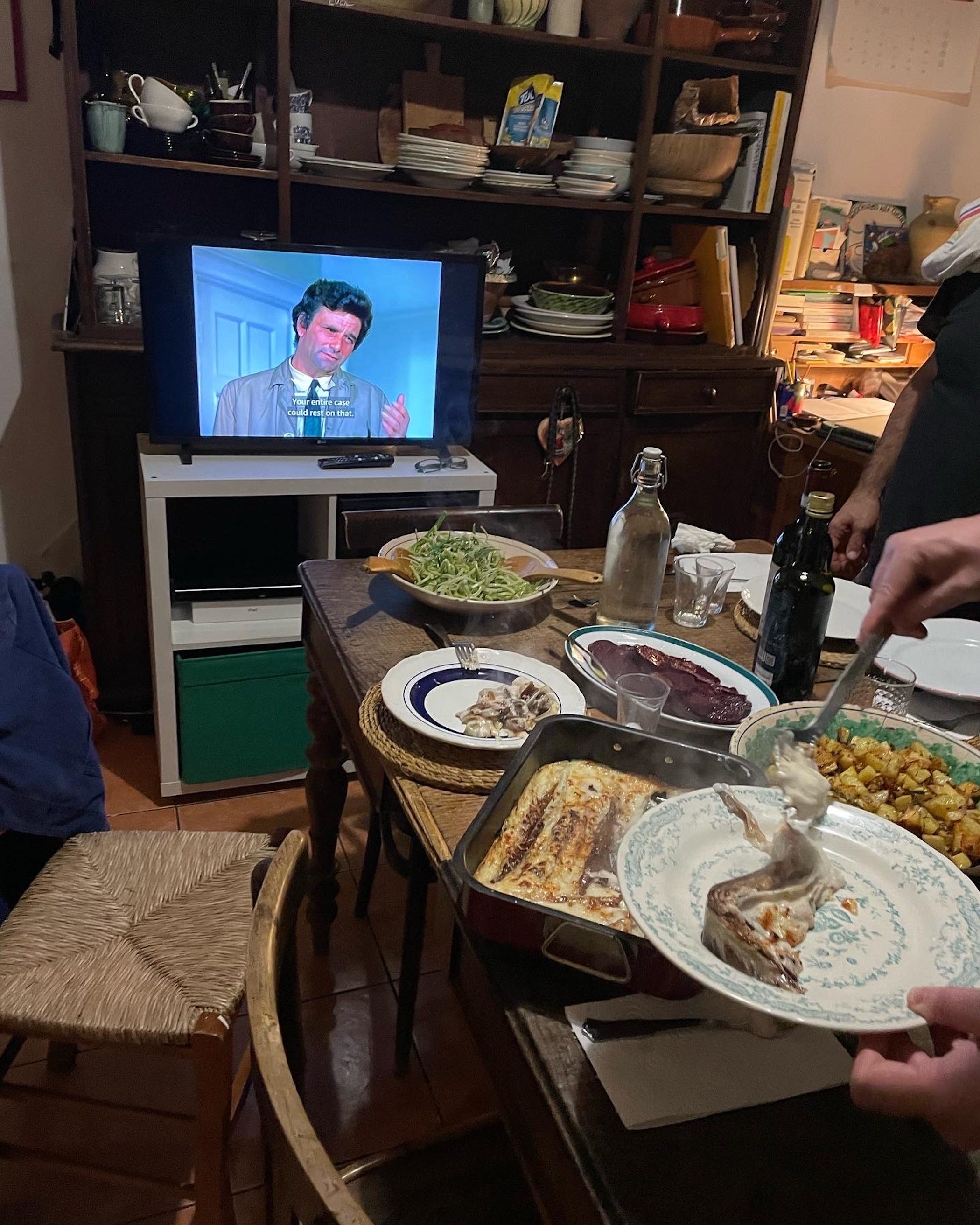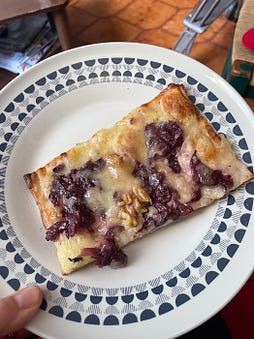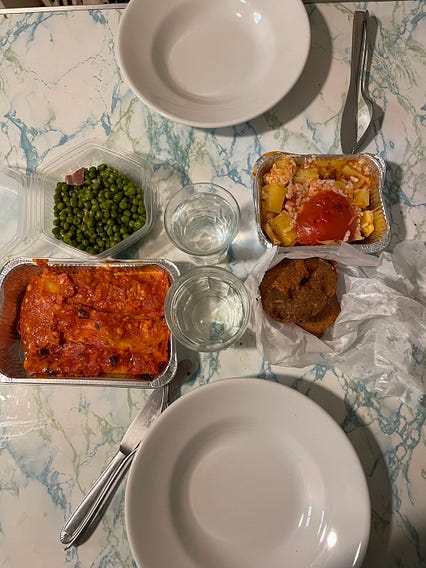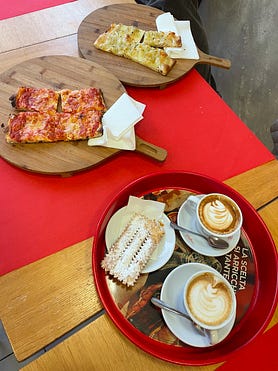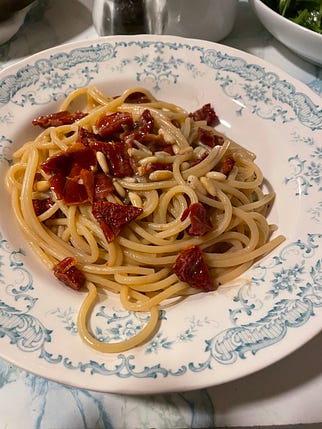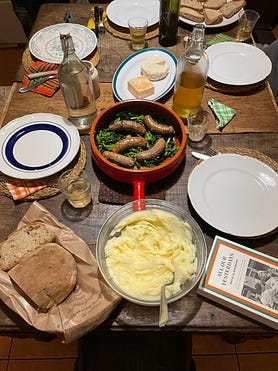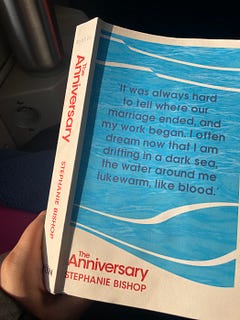Thank you for signing up to dinner document by Rebecca May Johnson! If you’d like to support my work, become a paying subscriber. Hello! My name is Rebecca May Johnson, I am a writer and cook and this is my Substack. This week’s newsletter is an account of a TV dinner with Columbo, eating notes, listening and reading notes. By the way, I no longer email out the audio versions of the newsletters – to save your inboxes! But they are available on the Substack site or via Apple and Spotify podcasts. Here are the last two episodes: Holiday Salad and New Year Lentils.
Columbo in Rome
Columbo, ‘Double Exposure’ (1973) My friend Rachel recently begun watching the TV series Columbo from the first episode after reading the passage about Columbo and eggs in my book. While we were in Rome, she invited us over to watch an episode with a Sunday meal in her flat, and when we arrived a TV had appeared in the kitchen on a little rolling stand next to the table. The table became a cinema! We made the dinner together – I sat at the table and did what Rachel asked. When I was handed two garlic cloves, I guessed I was being asked to make a dressing for puntarelle – I have made it several times. Two garlic cloves pounded in a pestle and mortar, then five or six anchovies added too, then a 6 or so tablespoons of olive oil mixed in, then a little lemon and a little red wine vinegar for acidity. I like the dressing for puntarelle to be sharp and quite garlicky. In restaurants while we were in Rome we tasted a few different styles: sometimes the dominant flavour is anchovy, sometimes garlic, and at one restaurant in the Jewish quarter it was overtly vinegary, which I also liked. I peeled beetroots, too. The menu for Rachel’s TV dinner was: radicchio tardivo in white sauce potatoes roasted with rosemary beetroot salad puntarella alla romana then: chocolate starch pudding (warm) with whipped cream and oranges The chocolate pudding – budino – was just wow! While we ate this feast of vegetables we watched “Double Exposure” (1973) an episode of Columbo in which ‘subliminal marketing’ guru Dr Keppel intercuts an advertising film with images that cannot be consciously seen to influence a man to feel thirsty and go out in search of water. When the man stands at the water fountain Dr Keppel shoots him. Keppel – who is freakishly slick and whose field of work is indicative of is love of control – tries to impose his narrative onto Columbo. But Columbo knows that those who speak with such assured authority are usually guilty – and like a weed he finds improbably small cracks in his narrative edifice and keeps creeping until the whole thing falls down. At the end Columbo uses ‘subliminal cuts’ to influence Keppel into exposing the place he has hidden the murder weapon. Hubristic even when the game is up, Keppel grins maniacally as he realises Columbo used his technique to solve the case. Columbo’s apparent lack of knowledge of the ‘proper’ way to conduct himself around money and power is maddening to the men he topples in almost every episode, who speak in management aphorisms or the language of wine snobs. In the way that Columbo can become almost anything to me when I think about it enough (e.g., an egg, as I suggest in my book) I began to think of the ways in which Peter Falk’s Columbo is like a weed in Rome, toppling and dislodging the grand buildings of authority. The appeal of Falk’s portrayal is of Columbo as a shabby figure who refuses respectability and power in its various guises (ironic of course given he is a cop). In contrast to Turin where we stopped off on the way home, Rome is full of weeds – they are truly everywhere – even in the centre of town. It’s a city of ancient buildings ruled over by cats and unsettled by weeds. The interruption of its grandeur in this way, its Columbo-like dishevelment, makes the city feel accommodating to me. Eating Notes A slice of radicchio and walnut pizza from Passi in Testaccio, Rome. Delicious! A meal from a Tavola Calda eaten in the flat: spinach and ricotta canolloni, peas with bacon, breadcrumbed meat patties and tomatoes stuffed with rice and potatoes. Everything was really well seasoned and well cooked. Pizza rossa with mozzarella and pizza with potato, two cappuccini and a ‘frappe’ or a fried carnival pastry dusted with icing sugar, which I dipped in the coffee. From Il Fornaretto di Trastevere, which I really like. After walking along porta portuese market in the rain – the longest market I have ever been to! We bought two etched wine glasses from the market for a euro each. We ran out of olive oil and I cooked pasta with sundried tomatoes revived in some hot water, toasted pinenuts, garlic in butter. A final dinner with Rachel and Vincenzo before we got the train home of broccoletti and sausages with mashed potato. We played the drawing game ‘exquisite corpse’ several times after eating with Luca. Listening and Reading Notes In Rome I listened to these songs a lot –
I read 4.5 books while I was away: Alexander Chee How to Write an Autobiographical Novel, Sally Rooney Normal People, Joan Didion South and West, Ottessa Moshfegh Lapvona, and half of Stephanie Bishop’s The Anniversary on the train home. I enjoyed all of them very much and felt renewed in my ability to take pleasure in novels. Very very brief thoughts: in Alexander Chee’s book, which is a collection of memoir-essays, I liked his writing about a childhood holiday, tarot, and about learning to write, especially his complication of the concept of the autobiographical novel. Sally Rooney, woo – she can write a novel! Joan Didion, my god even her notes for an unwritten piece contain some of the finest sentences I have read; very precise observation of people to portray a place. Lapvona brought me back to my academic roots studying smutty medieval German literature and felt like an accurate portrayal of the obscene political moment in which we now live. Stephanie Bishop’s The Anniversary (out in March) is a very addictive read - a fever dream about a writer getting everything they want and living out all their nightmares at the same time. It is so smart on so many things – though at times alarming to read when one is a writer and has just published a book. — Two food-related quotes from Didion and Moshfegh.
(Joan Didion, South and West)
(Ottessa Moshfegh, Lapvona) You’re a free subscriber to dinner document by Rebecca May Johnson. For the full experience and to support my work, become a paying subscriber. You can buy my book Small Fires, An Epic in the Kitchen here (UK), or pre-order (US) for June 2023. |


